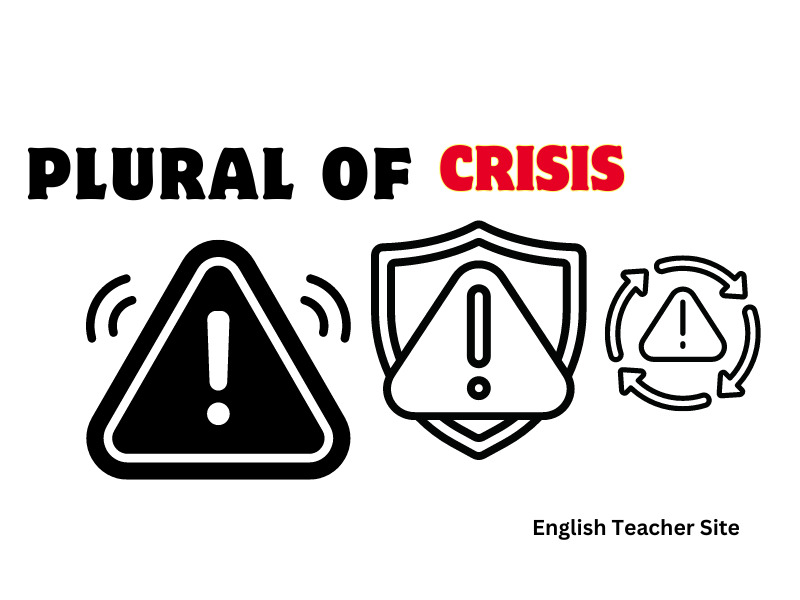What’s the Plural of Crisis: Understanding English Grammar Rules

- The singular noun “crisis” becomes “crises” in the plural.
- The pronunciation of “crises” is distinct and follows a specific linguistic pattern.
- Knowledge of the plural form allows for precise communication in various fields.
The plural of “crisis” is “crises,” pronounced as ‘KRY-seez’. This follows a pattern found in words of similar origin, where the ‘is’ ending is replaced with ‘es’ to form the plural. Knowing the correct plural form is crucial when discussing multiple situations that can be characterized as crises, such as economic downturns, political upheavals, or natural disasters.
| Singular | Plural |
|---|---|
| crisis | crises |
The singular noun “crisis” represents a significant turning point or a difficult situation demanding resolution. Its plural form, “crises,” is pronounced (cry-seez) and is used when referring to multiple such events or situations. Incorrect forms such as “crisises” or “criseses” are not recognized in standard English.
When to Use “Crises”
- Discussing several instances of economic downturn.
- Reflecting on moments of political instability within a country.
- Addressing various medical emergencies that occur simultaneously.
| Correct Use | Incorrect Use |
|---|---|
| “The company faced several crises last year.” | “The company faced several crisis last year.” |
| “World leaders must manage global crises effectively.” | “World leaders must manage global crisises effectively.” |
Why is “Crises” the Plural of “Crisis”?
“Crisis” becomes “crises” in the plural form due to a specific grammar rule applicable to certain nouns ending in ‘is’. This transformation reflects a pattern seen in other borrowed Greek words. Here’s how the conversion takes place:
- The singular form “crisis” has the ending “-is”.
- According to the rule for Greek-derived nouns, the “-is” changes to “-es” for the plural.
- As a result, “crisis” changes to “crises”.
Examples of Singular to Plural Transformations:
| Singular | Plural |
|---|---|
| crisis | crises |
| thesis | theses |
| diagnosis | diagnoses |
These irregular pluralizations follow distinct patterns seen across the English language.
Factors to consider in word pluralization:
- The origin of the word (Greek in this case)
- The ending of the singular form (“-is”)
- The rule applied to convert to a plural form
- Origin: The word “crisis” comes from the Greek “krisis”, meaning “decision”.
- Singular Ending: In English, “crisis” retains the Greek ending of “-is”.
- Plural Rule: English adopts the Greek pluralization rule, changing “-is” to “-es”.
Examples of Crisis in Sentences
Here’s how it might appear in a sentence:
- The country faced an economic crisis last year.
- During the crisis, she remained calm and focused.
In contrast, “crises” is used when speaking about multiple instances or periods of difficulty. Below are sentences that demonstrate the usage of “crises”:
- The new policies aim to address the ongoing financial crises in several countries.
- Doctors are trained to handle multiple health crises simultaneously.
To further clarify, a couple of tables are presented to illustrate different contexts.
| Singular “Crisis” | Application in Sentence |
|---|---|
| Emotional crisis | John is going through an emotional crisis right now. |
| Identity crisis | The company is facing an identity crisis due to rebranding. |
| Plural “Crises” | Application in Sentence |
|---|---|
| Economic crises | Many nations have overcome severe economic crises. |
| Political crises | These political crises have shaped the current election. |
Examples of Crises in Sentences
When referencing multiple emergencies or times of intense difficulty, one must use “crises” rather than the singular “crisis.” Below are examples that demonstrate how “crises” is correctly used in various sentences:
- In the wake of the economic downturn, the country faced multiple financial crises that tested the resilience of its institutions.
- Medical professionals often train extensively to handle health-related crises efficiently.
- The management team met to discuss the upcoming crises projected for the next quarter.
To further illustrate the usage, consider these two tables with sentences comparing the singular and plural forms:
Singular Usage
| Singular Form | Example Sentence |
|---|---|
| crisis | She faced a crisis during the merger. |
Plural Usage
| Plural Form | Example Sentence |
|---|---|
| crises | They devised a plan to overcome the market crises. |
Key takeaway: Use “crisis” for a singular event and “crises” for multiple situations.
- Historical crises: During the 20th century, the world endured many historical crises, such as wars and economic depressions.
- Personal crises: Individuals often seek counseling when dealing with personal crises like divorce or bereavement.
- Environmental crises: Governments globally are collaborating to address ongoing environmental crises, including climate change and biodiversity loss.
Synonyms for Crisis
Emergencies and Extremities:
When discussing a situation that demands immediate attention, the following synonyms can be suitable replacements for “crisis”:
| Word | Context of Use |
|---|---|
| Emergency | A situation requiring urgent assistance or action |
| Exigency | A pressing or urgent situation |
| Head | A crucial or decisive point that requires resolution |
Situational Synonyms:
Different words may be more fitting depending on the nature and scope of the crisis:
- Predicament: A difficult, unpleasant, or embarrassing situation.
- Quandary: A state of perplexity or uncertainty over what to do in a difficult situation.
- Plight: A dangerous, difficult, or otherwise unfortunate situation.
When a “crisis” involves a turning point or a critical phase, the following terms might be used:
| Word | When to Use |
|---|---|
| Crossroads | A point at which a crucial decision must be made |
| Crunch time | A period when pressure to succeed is great |
| Flash point | A moment of crisis or a point at which violence erupts |
Terms Reflecting High Stakes:
For emphasizing the severity or potential danger of a situation, these words are apt:
- Boiling point: The point at which a situation becomes critical or volatile.
- Catastrophe: A sudden and widespread disaster.
- Conundrum: A confusing and difficult problem or question.
Phrases Synonymous with Crisis
Grasping the concept of a crisis can be pivotal for understanding the gravity of a situation that demands immediate attention. In English, multiple phrases echo the essence of a crisis, each bringing its own nuance to the table. Exploring these synonymous phrases enhances one’s lexical repertoire and provides alternative ways to articulate a critical situation. Here, we present them in a structured format to aid clarity and retention.
| Common Phrases | Contextual Meaning |
|---|---|
| Critical juncture | A turning point where decisions have significant impact |
| Emergency | A sudden, urgent situation requiring immediate action |
| Breaking point | A moment of extreme stress beyond which something may fail |
In a more detailed examination:
- Critical juncture: Often denotes a crossroads where significant decisions will shape future outcomes.
- Emergency: Highlights the urgency and unanticipated nature of the event.
- Breaking point: Implies a threshold which, when exceeded, can lead to collapse or change.
Further exploring the synonymous landscape, one might encounter:
- Precipice
- Flashpoint
- Tipping point
Each term carries with it a weight of immediacy and the requirement for swift action. Here’s a comparative snapshot:
| Phrase | Common Use in Sentences |
|---|---|
| Precipice | Used to signify being on the brink of a potentially disastrous event. |
| Flashpoint | Indicates a particular incident igniting widespread controversy or conflict. |
| Tipping point | Marks the critical threshold beyond which significant and often irreversible effects or changes occur. |
Sources
- Example sentences crisis from dictionary.com
- Definition of crisis
- Noah Webster
- Synonyms of crisis/crises
- Harper, Douglas. “Etymology of crisis.” Online Etymology Dictionary, https://www.etymonline.com/word/crisis.
- Crisis, Oxford Learner’s Dictionary,
My name is Khamis Maiouf. I am the creator of the English Teacher Site, dedicated to providing valuable resources and insights for students around the world. With a passion for education and a commitment to helping students enhance their skills, I aim to make English teaching more effective and enjoyable for both educators and students.





